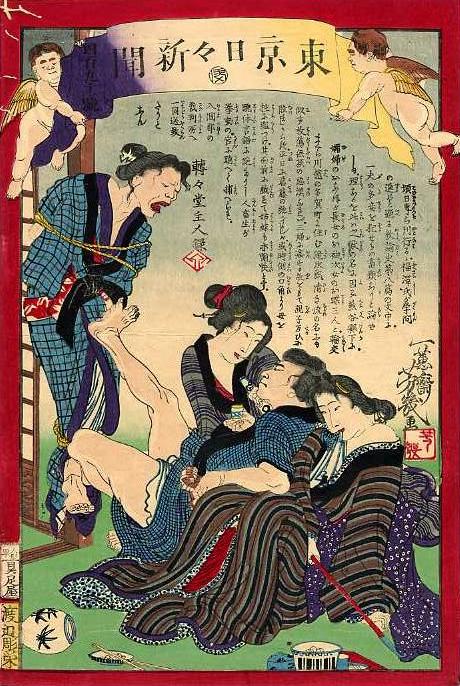
|
Gusokuya edition
Yosha Bunko
|
Tokyo nichinichi shinbun
No. 491
1873-9-28 (1874-10x)
Man with three women
Story in brief
"Recently it's being published everywhere. Mr. Fukuzawa, in Book Eight of a history of instructional writing (oshiebumi) called Gakumon no susume, holds that a husband who violates multiple mistresses is a domestic animal."
Thus begins this story about a man named Takijiro, who lives in Tagamachi in Kawagoi prefecture (an error or dialect for Kumagaya prefecture), now Saitama prefecture. There he has his way with the widow Natsu and her two daughters Osode and Ocho. At one point in the debauchery, he ties the jealous widow to a pillar and carries on with the daughters. Word gets around and Takijiro is arrested and sent to stand trial at a court in Iruma district. (WW).
Commentary
Mr. Fukuzawa refers to Fukuzawa Yukichi (1835-1901).
Gakumon no susume (1874), Fukuzawa's most famous work, was then just being published in installments.
a husband who violates multiple mistresses is a domestic animal reflects 一夫の多妾を犯せるハ畜類なり (ippu no taseu wo wokaseru ha chikuruhi nari) or "ippu no tashō wo okaseru wa chikurui nari" in present-day orthography and romanization. This alludes to, and paraphrases, the following lines from a section "mistresses" or "concubines" (妾 shō, mekake) in Book 8.
|
Japanese text Iwanami Shoten bunko edition, 86th printing, 2006, page 78
English translation William Wetherall
|
|
右は姦夫淫婦の話なれども、またここに妾の議論あり。世に生るる男女の数は同様なる理なり。西洋人の実験に拠れば、男子の生るることは女子よりも多く、男子二十二人に女子二十人の割合なりと。されば一夫にて二、三の婦人を娶るは固より天理に背くこと明白なり。これを禽獣と言うも妨げなし。
|
As for the left [critique of "Onna daigaku"] it is a story [talk, discussion] of wayward husbands and wanton wives, but there is also here an argument [debate, discussion] of concubines [mistresses]. As for the numbers of men and women who are born in the world, it is a principle that they are equal. According to experiments [investigations] of west-ocean-ers [westerners], more males are born than females, and it is a ratio of 20 females to 22 males. So it is clear that the taking of two or three wives by one husband is something that turns a back on [contravenes] the principles of heaven. There is no hindrance to calling them [such husbands (if not also their wives)] beasts.
|
The term 畜類 (chikurui) appears shortly after the above passage from Book 8, at the end of phrase in which Fukuzawa -- referring to the homes of men with multiple wives and siblings who have different mothers -- declares 人の家に非ず、畜類の小屋と言わざるを得ず (Ibid., page 79) -- which translates "[these] are not homes of people, and cannot not [cannot but, have to] be called sheds of domestic animals" (Wetherall).
|